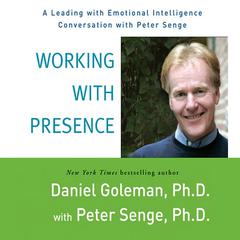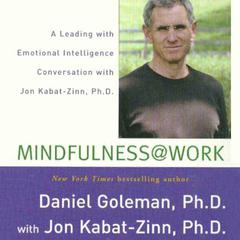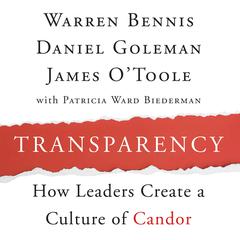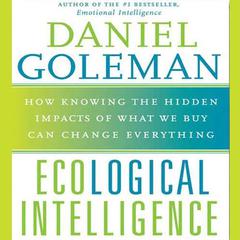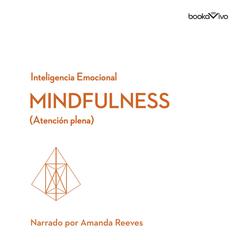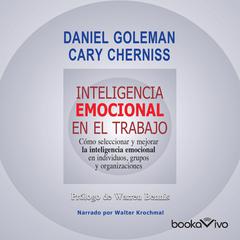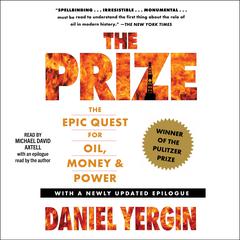 Play Audiobook Sample
Play Audiobook Sample
Ecological Intelligence: How Knowing the Hidden Impacts of What We Buy Can Change Everything Audiobook
 Play Audiobook Sample
Play Audiobook Sample
Quick Stats About this Audiobook
Total Audiobook Chapters:
Longest Chapter Length:
Shortest Chapter Length:
Average Chapter Length:
Audiobooks by this Author:
Publisher Description
In Ecological Intelligence: How Knowing the Hidden Impacts of What We Buy Can Change Everything, Daniel Goleman recasts the uproar over global warming and the assault of man-made toxins into our bodies in terms of the collective self-deception which both created this crisis and holds a key to its solution. Ecological Intelligence argues that "green" labels and recycling programs may do more harm than good by feeding a vital lie, lulling us into the illusion that we are doing enough already while ignoring the adverse impact of the far vaster proportion of what we buy and do. The book brings a psychologist's insights into the world of commerce, arguing for radical transparency--tracking every substantial impact over the life cycle of an item, from manufacture to daily use, to disposal--and surfacing those impacts at the point of purchase. The movement toward such transparency augurs a day when the free market will operate in public interest.
Download and start listening now!
"This book is highly informative and up to date about the hidden impact of the products we use in our day to day life. A good read for any one to understand the impact of the goods we use from a scientific perspective. The beauty of this book is that a moderately high technical content is written in an easy to understand and appreciate manner."
— Uchill (4 out of 5 stars)
Quotes
-
“Goleman narrates his own work in a clear, lively, and well-paced... tenor.
— AudioFile -
Goleman reads his work with precision, in a voice that shows his age and reveals much wisdom, warmth, and humanity.
— SoundCommentary.com
Awards
-
Among longlisted titles for AudioFile Best Voices, 2009
Ecological Intelligence Listener Reviews
-
" Very thought provoking! I plan to put this into practice. "
— Rita, 2/10/2014 -
" very slow, but interesting concepts "
— Clint, 1/28/2014 -
" Gives an eye-opening look at how we create large environmental footprints even when we're trying to do the opposite. "
— Sandra, 1/27/2014 -
" I just feel like this book is redundant and continuously blames the public for all of the world's problems. And there are excessive advertisements for this book. "
— Rachel, 1/15/2014 -
" A look at our consumption that aims at getting us to think smarter and more holistically about environmental problems. Essentially Goleman is arguing for full disclosure on products from companies, and for consumers to think systemically about all sorts of environmental issues (rather than one thing) There is an explicit critique of greenwashing here (presenting a product as green because it is recycled or whatever when other parts of it are not environmentally great). I think other books say this better, and this is slightly dated. Still some good stuff "
— James, 1/13/2014 -
" Assumes you know the ecology. This book is focused on the idea that 'radical transparency' regrading the origins and production processes of the goods we buy would allow us to make market choices that would create more sustainable consumption. It shows some interesting examples of what market pressure can do when the public is informed. But we are far from the state of information Goleman considers necessary and would take a lot of activism in people demanding the information which many, if not most, companies want to withhold. And it is still based on the idea of a heavily consumerist society with not much emphasis given to the idea that humans might have to radically limit that consumption. Still, it is well worth reading and show how complicated considering all the factors to determine the ecological cost of any given product is. "
— Willowwind, 1/7/2014 -
" Ecological Intelligence: How Knowing the Hidden Impacts of What We Buy Can Change Everything by Daniel Goleman was chosen by Soundview Executive Book Summaries as one of the Top 30 Business Books of 2010. "
— Soundview, 1/2/2014 -
" This book give great insight into the complexities of moving towards a "green" economy. However, the more consumers know or learn about the product and the ramifications towards the environment, the better equipped they will be to make good choices on the brands they buy and use. "
— Lisa, 12/7/2013 -
" Goleman has a very optimistic view on radical transparency. It's nice to read a book that explains how we are ultimately heading in the right direction, not just doom and gloom. "
— Joseph, 11/27/2013 -
" Depressing...only because I don't always have the energy to take on more eco-worries. But it's great info. "
— Jenny, 11/24/2013 -
" This was the "common book" at Virginia Tech this year, so it was a recommended read before you attended. It brought up an interesting point about the Life Cycle Analysis, but then proceeded to repeat the point over and over. Wasn't too bad for a book I didn't choose, but it wasn't that great. "
— Ashley, 11/21/2013 -
" A must read if you consider yourself an environmentalist/consumer. Apparently even when we think we're doing the right thing.....we actually don't know what we're doing. Very provocative and interesting. "
— Maureen, 11/16/2013 -
" Was quite interesting and had actual application instead of theory only. I got more out of it by having book club discussion with my former Economics and Environmental Econ professor, but a very appropriate book to consider consumption and alternatives to consumption behavior in the US. "
— Abbi, 11/3/2013 -
" I got a few good things out of it - but it could have been organized better. Repeated many things, too. Sources not sourced. "
— Keihly, 9/27/2013 -
" A little bit boring but made very good points and talked about interesting eco-concerns that we should all know about. The most important thing was that the author presented information without bias and covered issues from many points of view. "
— Sarah, 2/1/2013 -
" Worth reading -- but the author could probably have said what he needed to say in half the number of pages. The hidden impact of what we buy is astounding (and daunting) and is something we, as consumers, need to know. "
— Amy, 11/27/2012 -
" The thesis is that buying power can change the world. Goleman may have slightly over-extended his argument, but he makes a persuasive case. "
— HBalikov, 9/1/2012 -
" I didn't find this to be terribly well written but was an interesting and sometimes inspiring read. "
— Robin, 8/11/2012 -
" Managed to be long-winded while giving barely any information. Also read as a book-long advertisement for a particular product. "
— Bon, 6/26/2012 -
" Interesting... but nothing really new. Ecological movement, groups and thinkers, managed these ideas since 1980s. Anyway, usefull and positive. "
— Mikel, 5/14/2012 -
" I am passionate about this subject. Ecological intelligence is the future if we can get access to all the data out there. The book was dry at times, yet I learned a lot when I could focus my attention on it. It's worth reading if you want to learn more about the things you buy. "
— Elaina, 11/28/2011 -
" A little bit boring but made very good points and talked about interesting eco-concerns that we should all know about. The most important thing was that the author presented information without bias and covered issues from many points of view. "
— Sarah, 3/9/2011 -
" Was quite interesting and had actual application instead of theory only. I got more out of it by having book club discussion with my former Economics and Environmental Econ professor, but a very appropriate book to consider consumption and alternatives to consumption behavior in the US. "
— Abbi, 11/2/2010 -
" Dude, I think you meant to say "Algorithm", not "Logarithm". "
— Tom, 11/1/2010 -
" Very thought provoking! I plan to put this into practice. "
— Rita, 6/13/2010 -
" I got a few good things out of it - but it could have been organized better. Repeated many things, too. Sources not sourced. "
— Keihly, 6/3/2010
About Daniel Goleman
Daniel Goleman, a former science journalist for the New York Times, is the author of thirteen books and lectures frequently to professional groups and business audiences and on college campuses. He cofounded the Collaborative for Academic, Social, and Emotional Learning at the Yale University Child Studies Center, now at the University of Illinois, at Chicago.
















